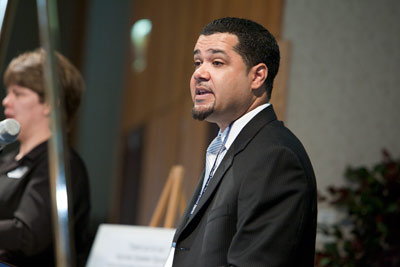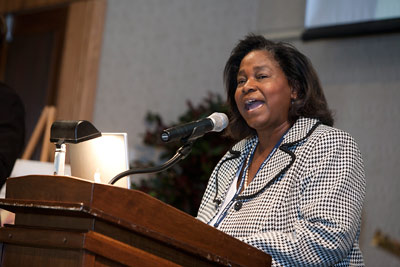Work cultures need to change, say conference speakers
By Nancy Doolittle


The word "diversity" is overused and means too many things, concurred speakers at the 2011 Diversity Community Roundtable, June 9, at Ithaca College.
Instead, they encouraged the more than 200 attendees from area colleges, organizations, companies and government services to change the culture of their organizations, not just the numbers of individuals who represent different aspects of diversity.
The more categories -- race, ethnicity, age, gender, sexual orientation, geographic location and other traits or skills -- that are included in the definition of diversity, the more the meaning of diversity runs the risk of being diluted, warned keynote speaker Sean Eversley Bradwell, Ph.D. '08, assistant professor at the Center for the Study of Culture, Race and Ethnicity at Ithaca College. "There is not a single person in the room who doesn't identify with at least one aspect of diversity," he said.
In reality, diversity programs are racial in origin, and diversity is most often "a code word" that amounts to little more than tokenism, he said. "We put one person in place as opposed to changing the culture of an entire organization," he said. "Don't hire me because I am diverse; hire me because I am good."
Topics of concurrent sessions, some led by Cornell staff, addressed such cultural changes that are needed to create a welcoming environment as including transgender people, ex-offenders, veterans with disabilities, multiple generations and people of the entire spectrum of races, ethnicities and religion in the workplace.
For example, workplaces that are truly inclusive of transgender people have policies that support gender identity and expression, leaves of absence and health benefits for staff in transition, increased supervisor awareness of transgender issues, inclusive personnel forms, non-gender-specific dress codes, and gendered and unisex restrooms, said Matthew Carcella, associate dean of students and director of Cornell's Lesbian, Gay, Bisexual, Transgender Resource Center.
Another example concerns veterans returning from Iraq or Afghanistan, especially those with such non-apparent disabilities as post-traumatic stress disorder or traumatic brain injuries, said Hannah Rudstam, senior extension faculty member for Cornell's Employment and Disability Institute, citing recent surveys conducted by the ILR School and the national Society for Human Resource Management. The surveys found that many employers do not yet have support in place for such veterans. And most human resource professionals cannot identify possible accommodations for such common symptoms as memory loss or the inability to sleep, concentrate or cope with stress, she said, while even more do not know how to actively recruit veterans with disabilities.
Noting that five generations will co-work by 2020, Lynette Chappell-Williams, chair of the roundtable and associate vice president for workforce diversity and inclusion at Cornell, focused on the effects that the newest generation will likely have on employment policies, work rules and practices, supervision, job descriptions and productivity.
"The diversity roundtable discussions provided a foundation for proactively addressing the changing demographics that we will be experiencing over the next few years," said Chappell-Williams. "Diversity issues will not only need to continue to be addressed at Cornell, but within the local community as well. Working together, we will garner greater success."
Ithaca College President Thomas Rochon provided the opening welcome, and Kristina Belanger, president of the Diversity Consortium of Tompkins County, provided a closing synthesis. Experts from the Tanenbaum Center for Interreligious Understanding, New York State Department of Labor, Society for Human Resource Management of Tompkins County, Ithaca College and Syracuse University also presented.
Media Contact
Get Cornell news delivered right to your inbox.
Subscribe